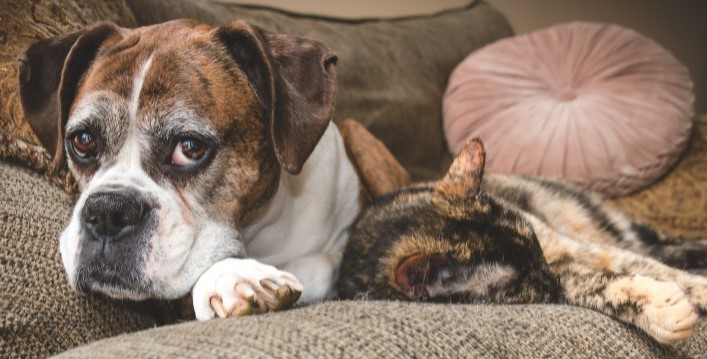
After a long life well-lived, your
older pet certainly deserves a month in its honor. In fact, November is
National Senior Pet Month, a month dedicated to pampering and appreciating our
senior pets. Try a few of these suggestions to give your senior citizen a
little extra love:
·
Treat Your Pet to a Massage. Massage eases muscle and soft tissue pain, improves blood
flow, eases anxiety, and reduces stiffness. Start the massage by lightly
running your hands over your pet's body. If your furry friend objects or seems
to be in pain at any point during the massage, stop immediately. If your pet
likes the massage, deepen the pressure slightly. Don't get too close to the
bones or joints, as this can be painful. The American Kennel Club recommends
starting at the head and neck area and working your way down the body.
·
Make Your Home Accessible. Your older pet may not use a walker or wheelchair, but
chances are, they have some age-related mobility issues. If arthritis or other
joint problems make jumping difficult, add a ramp or small set of stairs to
your dog or cat's favorite high places. These additions make it possible to
enjoy a warm nap next to the window, snuggle with you on the couch or bed, or
climb your front steps without pain. Take a look around your home and search
for hazards that could injure your pet, such as loose throw rugs or slippery
basement steps. Get rid of hazards or modify them to eliminate danger.
·
Avoid Changes. Change is good, unless you're an older pet. Dementia,
arthritis, failing eyesight, and other health problems may make it harder for
your pet to navigate your home easily. Now is not the time to rearrange the
furniture or bring your pet along on your daily runs if it's not used to
running with you.
·
Make Bathroom Modifications. Older pets may need to go outside or visit the litter box more
often than younger pets. Pets that have dementia may forget that they need to
eliminate and might experience housetraining accidents. Schedule more frequent
trips outside for your senior dog, especially after eating or napping. Puppy
pads can prevent damage to your floors in the event that your pet can't make it
outside or to the litter box in time. If your older cat has been having
accidents, add litter boxes to every floor of your home, and take your pet to
the litter box throughout the day. Litter boxes with low sides are helpful if
your cat has stiff, painful joints.
·
Help with Grooming. Matted fur can be a sign that your older cat has trouble
grooming itself. You can help by brushing your pet's coat every day. Long
nails, a common problem in senior pets, make walking uncomfortable. Nails
become long much more quickly than usual if your dog or cat isn't as active as
it once was. Inspect your pets' nails every week, and cut them before they curl
under and interfere with walking.
·
Food. Older pets may not need as much food if they've become
less active. In fact, eating too much could cause weight gain and lead to
obesity-related health issues, like heart disease or diabetes. Gaining weight
also stresses the joints and can worsen arthritis symptoms. According to the
American Animal Hospital Association (AAHA), pets are overweight if they're
just 10 to 20% over their ideal weight. If your pet has been gaining weight,
your veterinarian may recommend a special senior diet or suggest feeding your
furry friend a little less.
·
Provide a Comfortable Resting
Place. A soft, cozy bed is a must for
leisurely naps. Make sure the bed you choose provides ample room to turn around
and stretch out. If your pet has arthritis or another joint condition, an
orthopedic bed may be ideal. The beds reduce pressure on achy joints.
·
Schedule a Checkup. Signs of illness aren't always obvious in older pets.
Regular checkups help identify potential health or dental issues and offer
prompt treatment. Although yearly visits are fine for younger pets,
twice-yearly checkups are recommended for senior pets.